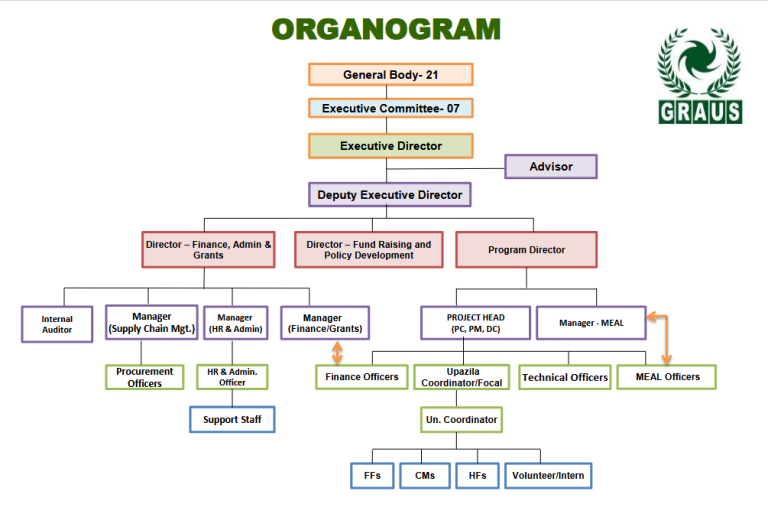
GRAUS operates with a structured hierarchy designed to efficiently manage its development initiatives.The organizational structure of GRAUS (Gram Unnayon Sangathon) is designed as a comprehensive and multi-tiered system that ensures effective governance, leadership, operational efficiency, and strong grassroots-level implementation. The organogram reflects a clear hierarchy, allowing smooth coordination across different levels of the organization while fostering accountability, transparency, and responsiveness to community needs.
At the top of the structure is the General Body, composed of 21 members, which serves as the highest governing authority within GRAUS. This body is responsible for setting broad policies and providing strategic direction for the organization’s development agenda. Directly below the General Body is the Executive Committee, a seven-member group tasked with providing executive oversight and ensuring that the policies and directives of the General Body are implemented effectively.
Leading the executive operations of GRAUS is the Executive Director, who serves as the chief executive and visionary leader of the organization. The Executive Director is supported by the Deputy Executive Director, who helps manage the daily operations and coordinates across various departments to ensure smooth functioning.
The Executive Director and senior directors are further supported by an Advisor who offers strategic counsel, technical expertise, and invaluable insights drawn from extensive experience. The Advisor plays a crucial role in enhancing executive decision-making by guiding leadership through complex challenges, shaping organizational strategies, and ensuring that all initiatives remain closely aligned with the mission and vision of GRAUS.
The senior management team includes several key directors who lead critical areas of organizational development. The Program Director oversees the planning, implementation, and monitoring of all programmatic activities, ensuring they align with the mission and goals of GRAUS. Complementing this role is the Director of Finance, Administration, and Grants, who is responsible for managing the organization’s financial systems, grant compliance, and administrative affairs. Additionally, the Director of Fundraising and Policy Development focuses on resource mobilization and strategic partnerships, while also steering advocacy and policy-related initiatives.
Project management is handled by Project Heads, who may serve as Project Coordinators (PCs), Project Managers (PMs), or District Coordinators (DCs), depending on the nature and location of the project. These individuals are accountable for the performance and results of specific projects and serve as a bridge between senior management and field-level teams. Supporting them at the sub-district level are the Upazila Coordinators or Focal Persons, who manage day-to-day activities and ensure effective coordination with local stakeholders. At the grassroots level, Union Coordinators are responsible for community-level engagement and supervision of field operations.
The organizational framework is further strengthened by several specialized units. The Human Resources and Administration Unit includes a Manager of HR and Admin and an HR & Admin Officer, who together ensure that internal systems and staff-related processes are efficiently managed. Financial operations are supported by Finance Officers, a Finance and Grants Manager, and an Internal Auditor, who ensure compliance with donor requirements and uphold financial integrity.
Procurement and supply chain management is handled by a dedicated Supply Chain Manager and a team of Procurement Officers, ensuring timely procurement and delivery of goods and services. The Monitoring, Evaluation, Accountability, and Learning (MEAL) Unit is led by a MEAL Manager, assisted by MEAL Officers, who play a key role in measuring project impact, learning, and improving organizational accountability.
To ensure technical excellence, Technical Officers provide expertise in specific thematic areas and contribute to program design, capacity building, and quality assurance. The Advisor also support technical and strategic initiatives, providing specialized knowledge to enhance program quality and organizational performance.
At the operational front, field-level implementation is carried out by a team of Community Mobilizers (CMs), Field Facilitators (FFs), and Health Facilitators (HFs), who work directly with community members to deliver services and mobilize participation. Their work is crucial to ensuring that the organization remains rooted in community realities and responsive to local needs.
Finally, Volunteers and Interns offer additional support across departments, gaining experience while contributing to the organization’s mission. The Support Staff provide essential logistical and operational assistance, enabling smooth day-to-day functioning.
Overall, the GRAUS organogram illustrates a well-integrated and functional structure where governance, leadership, technical expertise, advisory inputs, and field-level engagement come together to achieve sustainable development outcomes.
This structure enables GRAUS to streamline its operations, maintain accountability, and drive its mission of community empowerment, inclusivity, and cultural heritage preservation.
GRAUS operates through a well-defined organizational structure, ensuring efficient governance and program implementation. Led by the Executive Director and supported by key leadership roles, its departments- Finance & Administration, Project Coordination, Procurement, and Internal Monitoring- drive sustainable development and community engagement. This framework fosters accountability, inclusivity, and cultural heritage preservation in its mission.
About GRAUS
GRAUS (Gram Unnayon Sangathon), founded in 1998, envisions a society free from discrimination, hunger, and poverty. Dedicated to empowering marginalized communities, GRAUS fosters resilience and inclusivity through active participation in sustainable development. Registered with Bangladesh’s Ministry of Social Welfare and the Bureau of NGO Affairs, GRAUS is a proud member of IUCN and IIFB, reflecting its commitment to biodiversity conservation and climate solution.















Developed by Aung Chano Marma, Advisor, GRAUS Contact: 01620827555